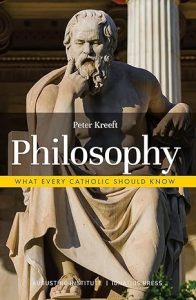
By Peter Kreeft.
Ignatius Press, 2023.
Paperback, 270 pages, $16.95
Reviewed by David Weinberger.
In the latest of his more than 100 books, philosopher Peter Kreeft answers 72 pressing philosophical questions ranging from “What is Philosophy?” to “What is the Soul?” to “What is Happiness, and How Can We Achieve it?” Written in one or two page replies and in everyday language, Philosophy: What Every Catholic Should Know is packed with insights not only for Catholics, but for all lovers of wisdom.
In fact, the love of wisdom is how philosophy was classically conceived. “Without love,” Kreeft warns, “there is no real philosophy.” Unfortunately, however, philosophy today is viewed not as the love of wisdom but as a game of cleverness, of who can invent the most sophisticated puzzle or argument to solve. This helps explain why so much academic philosophy is incomprehensible to the average person, and why the public tends to think of philosophy as pointless abstraction. Yet the loss of classical philosophy has deprived millions of young people of meaning, which has contributed to their mass turn toward political action to fill the void.
By contrast, Kreeft shows how the pursuit of beauty, truth and goodness—which lead to wisdom—enriches our lives. Beauty, he remarks, pulls us beyond ourselves toward truth and goodness: “Beauty is what first impresses us about truth and goodness. It is their child and their ambassador. It is the quality of all objects of love, as Plato taught in The Symposium. And it gives us an ecstasy, a ‘standing outside yourself,’ a blissful loss of self-consciousness.”
This point ought not slip us by, for it is not merely good, true and beautiful things that we want, but goodness, truth and beauty as they are in themselves. Aristotle observed that “all men by nature desire to know.” Not only do we have a natural curiosity to understand-–hence the unremitting stream of interrogation from the toddler who asks, “What’s that?”–-but no finite thing ever satisfies our never ending quest for knowledge. Whether we study bees, financial markets, sales techniques, woodworking or philosophy itself, we find that the complete understanding we yearn for forever eludes our grasp. Moreover, even when we have had our fill of some subject, do we ever say, “I now have all I ever need to know?” On the contrary, when we reach our capacity in one area we find ourselves sailing toward the next shore of knowledge to colonize, ever searching for the complete act of understanding itself. This is no less true for beauty and goodness. Even the most consuming mystical experience pales in comparison to our unrestricted drive for infinite beauty itself.
Recognizing these facts about the human condition, fifth century philosopher and theologian Augustine of Hippo, who experimented with various philosophies and religions as a young man searching for ultimate explanations, at last recognized that our unbounded desire for beauty, goodness and truth is in fact nothing less than our desire for the pure plentitude of infinite existence itself, or God. “You have made us for yourself, O Lord,” penned Augustine in his Confessions, “and our hearts are restless until they rest in You.”
As Augustine realized, it is not enough to merely know the good, the true and the beautiful. We must lead our lives in conformity with them. That is the key to life’s meaning. In fact, classical philosophers like Socrates, Plato and Aristotle also understood this, stressing the importance of training ourselves in accordance with these principles. For example, Plato encouraged music and gymnastics in early childhood education. Why? “For he knew,” says Kreeft, “that falling in love with beautiful forms in physical things and sounds and pictures and human bodies and their graceful actions is good training, at an age when rational and free choices are only embryonic, for the understanding and choice of morally good forms of action and life spiritually, which can develop more and more as the person matures.”
Today, however, the idea that we ought to live in conformity with truth, goodness and beauty—that there is indeed a good, true and beautiful way for human beings to live in order to thrive—strikes the modern ear as noxious and oppressive, saturated as we are with notions of personal autonomy like “live your truth.” But because we lack wisdom, we fail to understand that reality does not conform to us; we must conform to it. So “living your truth” leads long-range and deep down to unhappiness and frustration. Rather, it is by pursuing truth, goodness and beauty that we promote our flourishing and happiness as human beings.
Insights like these emerge throughout Kreeft’s book, and they are sorely needed right now in the Western world. Our happiness, indeed our long-term survival as a flourishing civilization, depends on our ongoing quest for wisdom. We must not let it die.
David Weinberger is a freelance writer and book reviewer on topics related to philosophy, culture, history, and economics. Follow him on Twitter @DWeinberger03.
Support the University Bookman
The Bookman is provided free of charge and without ads to all readers. Would you please consider supporting the work of the Bookman with a gift of $5? Contributions of any amount are needed and appreciated!